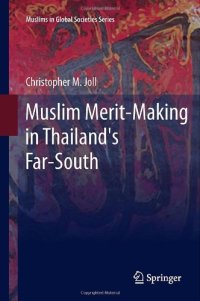
Ebook: Muslim Merit-making in Thailand's Far-South
Author: Christopher M. Joll (auth.)
- Tags: Religious Studies, Anthropology, Regional and Cultural Studies, Linguistic Anthropology
- Series: Muslims in Global Societies Series 4
- Year: 2012
- Publisher: Springer Netherlands
- Edition: 1
- Language: English
- pdf
This volume provides an ethnographic description of Muslim merit-making rhetoric, rituals and rationales in Thailand’s Malay far-south. This study is situated in Cabetigo, one of Pattani’s oldest and most important Malay communities that has been subjected to a range of Thai and Islamic influences over the last hundred years. The volume describes religious rhetoric related to merit-making being conducted in both Thai and Malay, that the spiritual currency of merit is generated through the performance of locally occurring Malay adat, and globally normative amal 'ibadat. Concerning the rationale for merit-making, merit-makers are motivated by both a desire to ensure their own comfort in the grave and personal vindication at judgment, as well as to transfer merit for those already in the grave, who are known to the merit-maker. While the rhetoric elements of Muslim merit-making reveal Thai influence, its ritual elements confirm the local impact of reformist activism.
This volume provides an ethnographic description of Muslim merit-making rhetoric, rituals and rationales in Thailand’s Malay far-south. This study is situated in Cabetigo, one of Pattani’s oldest and most important Malay communities that has been subjected to a range of Thai and Islamic influences over the last hundred years. The volume describes religious rhetoric related to merit-making being conducted in both Thai and Malay, that the spiritual currency of merit is generated through the performance of locally occurring Malay adat, and globally normative amal 'ibadat. Concerning the rationale for merit-making, merit-makers are motivated by both a desire to ensure their own comfort in the grave and personal vindication at judgment, as well as to transfer merit for those already in the grave, who are known to the merit-maker. While the rhetoric elements of Muslim merit-making reveal Thai influence, its ritual elements confirm the local impact of reformist activism.